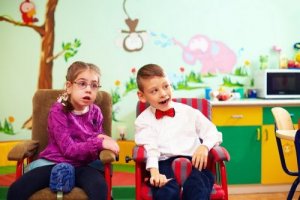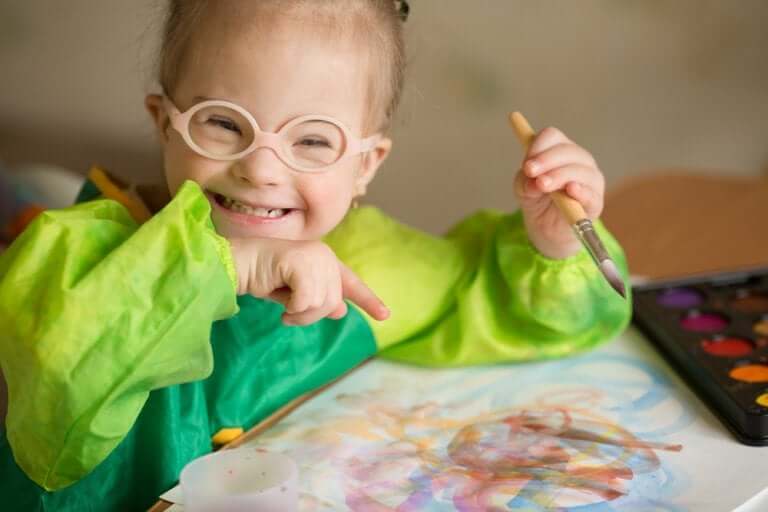Educational Support for Children with Learning Difficulties


Written and verified by the psychologist Ana Couñago
Educational support for children with learning difficulties is essential for achieving an inclusive school. Currently, there are several measures which encourage:
- Firstly, the complete integration of all students
- Secondly, the right to a decent education in ordinary schools or, in exceptional cases, in specialized centers.
“Everybody is a genius. But if you judge a fish by its ability to climb trees, it will live its whole life thinking that it is useless.”
–Albert Einstein–
Educational support for children with learning difficulties
Students with special educational needs related to learning difficulties have at their disposal a series of specific resources, such as:
- Personal support
- Special measures
- Changes to the curriculum
- Flexibility
- Individualized attention
These are all in place to help the students overcome learning barriers and receive fair and equal treatment. Thus, the main people responsible for teaching these children in an ordinary center are the main tutor and the support teachers.

Educational support from the main tutor
The classroom tutor has the responsibility of creating an understanding of diversity by promoting knowledge, mutual respect, and an acceptance of differences.
To do this, they must implement a series of measures tailored to the learning levels of all the children in the class, following an inclusive methodology. In this sense, they can choose from the following:
- Adapting methodologies and materials to the needs of all students
- Carrying out flexible groupings
- Proposing activities to the children with intellectual disabilities that are similar to those of their peers to children, but with some modifications, such as:
- Granting more time to carry out the tasks
- Simplifying the content or its presentation
- Giving explanations step by step
- Providing help and guidance
- Reducing the number of tasks required
- Creating a work routine which helps these students to be independent, and to promote self-determination.
- Spending more time on certain objectives or important content for all students, but especially for those with intellectual disabilities. In these, they should be working on:
- Communication
- Literacy
- Psychomotor skills
- The ability to use numbers and basic operations
- The ability to establish interpersonal relationships
- Establishing, in exceptional cases, significant curricular adaptations. These consist of:
- Firstly, eliminating the contents and objectives that are NOT considered essential
- Secondly, modifying the evaluation criteria
In addition, for all of this to be effective, it’s essential for the teacher to avoid the use of negative labels and comparisons. They should know how to handle the possible frustrations of students with intellectual disabilities to be able to prevent possible aggressive behavior or even self-harm.

Educational support from support teachers
Support teachers are extremely important in the development of people with learning difficulties. They’re often one of the main sources of teaching support in the school environment. They’re in continuous communication with the class tutor to reinforce and consolidate their teaching duties.
Therapeutic Pedagogy and the Hearing and Language staff are responsible for:
- Firstly, selecting, developing and adapting the teaching material
- Secondly, facilitating the assimilation of knowledge and information
- Thirdly, performing individualized educational support programs
Likewise, students with learning difficulties who don’t have personal autonomy skills need the assistance of a caregiver or an educational assistant throughout the school day to help them perform those skills.
Their main function is to provide educational support, but not teaching. As a result, they need to develop tasks relating to:
- Autonomy
- Accessibility
- Travel
- Health
- Safety
- Attention, vigilance and care
To summarize, having a student with learning difficulties means the need to implement specific and personalized educational support.
Educational support for children with learning difficulties is essential for achieving an inclusive school. Currently, there are several measures which encourage:
- Firstly, the complete integration of all students
- Secondly, the right to a decent education in ordinary schools or, in exceptional cases, in specialized centers.
“Everybody is a genius. But if you judge a fish by its ability to climb trees, it will live its whole life thinking that it is useless.”
–Albert Einstein–
Educational support for children with learning difficulties
Students with special educational needs related to learning difficulties have at their disposal a series of specific resources, such as:
- Personal support
- Special measures
- Changes to the curriculum
- Flexibility
- Individualized attention
These are all in place to help the students overcome learning barriers and receive fair and equal treatment. Thus, the main people responsible for teaching these children in an ordinary center are the main tutor and the support teachers.

Educational support from the main tutor
The classroom tutor has the responsibility of creating an understanding of diversity by promoting knowledge, mutual respect, and an acceptance of differences.
To do this, they must implement a series of measures tailored to the learning levels of all the children in the class, following an inclusive methodology. In this sense, they can choose from the following:
- Adapting methodologies and materials to the needs of all students
- Carrying out flexible groupings
- Proposing activities to the children with intellectual disabilities that are similar to those of their peers to children, but with some modifications, such as:
- Granting more time to carry out the tasks
- Simplifying the content or its presentation
- Giving explanations step by step
- Providing help and guidance
- Reducing the number of tasks required
- Creating a work routine which helps these students to be independent, and to promote self-determination.
- Spending more time on certain objectives or important content for all students, but especially for those with intellectual disabilities. In these, they should be working on:
- Communication
- Literacy
- Psychomotor skills
- The ability to use numbers and basic operations
- The ability to establish interpersonal relationships
- Establishing, in exceptional cases, significant curricular adaptations. These consist of:
- Firstly, eliminating the contents and objectives that are NOT considered essential
- Secondly, modifying the evaluation criteria
In addition, for all of this to be effective, it’s essential for the teacher to avoid the use of negative labels and comparisons. They should know how to handle the possible frustrations of students with intellectual disabilities to be able to prevent possible aggressive behavior or even self-harm.

Educational support from support teachers
Support teachers are extremely important in the development of people with learning difficulties. They’re often one of the main sources of teaching support in the school environment. They’re in continuous communication with the class tutor to reinforce and consolidate their teaching duties.
Therapeutic Pedagogy and the Hearing and Language staff are responsible for:
- Firstly, selecting, developing and adapting the teaching material
- Secondly, facilitating the assimilation of knowledge and information
- Thirdly, performing individualized educational support programs
Likewise, students with learning difficulties who don’t have personal autonomy skills need the assistance of a caregiver or an educational assistant throughout the school day to help them perform those skills.
Their main function is to provide educational support, but not teaching. As a result, they need to develop tasks relating to:
- Autonomy
- Accessibility
- Travel
- Health
- Safety
- Attention, vigilance and care
To summarize, having a student with learning difficulties means the need to implement specific and personalized educational support.
All cited sources were thoroughly reviewed by our team to ensure their quality, reliability, currency, and validity. The bibliography of this article was considered reliable and of academic or scientific accuracy.
- Cegarra, F. y García, G. (2013). Intervención educativa en el alumnado con discapacidad intelectual. http://virgendelpasico.net/orientacion/wp-content/uploads/2012/07/intervencic3b3n1.pdf
- Fierro, A. (2012). Los alumnos con retraso mental. En Á. Marchesi, J. P. González y C. Coll (Ed.), Desarrollo Psicológico Y Educación: 3. Trastornos Del Desarrollo Y Necesidades Educativas Especiales (pp. 273-299). Madrid: Alianza Editorial.
- Gobierno Autónomo Departamental de Santa Cruz. (s.f.). Guía para Profesores de Niños(as), y Adolescentes con Discapacidad Intelectual.
- Ke, X., & Liu, J. (2017). Discapacidad intelectual. Traducción de IRARRÁZAVAL, M., MARTIN, A., PRIETO-TAGLE, F. y FUERTES, O.). En REY, Joseph. Manual de Salud Mental Infantil y Adolescente de la IACAPAP, 1-28. Disponible en: http://chamilo.cut.edu.mx:8080/chamilo/courses/TRASTORNOYDIFICULTADESDEAPRENDIZAJE/document/PDF/Trastornos_del_aprendizaje/C.1-Discapacidad-Intelectual-SPANISH-2018.pdf
- Vived, E., Betbesé, E., Díaz, M., González-Simancas, A., & Matía, A. (2013). Avanzando hacia la vida independiente: planteamientos educativos en jóvenes con discapacidad intelectual. Disponible en: http://riberdis.cedd.net/handle/11181/3893
This text is provided for informational purposes only and does not replace consultation with a professional. If in doubt, consult your specialist.








